

 中文摘要:
中文摘要:
核仁小RNA(smallnucleolarRNA,snoRNA)是一类真核细胞核仁中的60~300个核苷酸长度的非编码RNA,主要参与rRNA和其它小RNA转录后的成熟加工过程。它们与肿瘤的关系曾一度被人们所忽视,然而,近年来有关snoRNA新功能的研究证明,它们与肿瘤的发生、发展密切相关。snoRNA以多种方式参与肿瘤的发生:一些snoRNA(如:U50、SNORD12、SNORD12b、SNORD12c、SNORD44和h5sn2等)具有抑癌活性,而另一些snoRNA(如:SNORD33、SNORD66、SNORD76、SNORD112、SNORD113、SNORD114、SNORA42、U70C和ACA59B等)具有促癌活性。另外,编码snoRNA基因的异常也被发现与肿瘤的发生有关.因此,开展snoRNA与肿瘤关系的研究将有可能为肿瘤诊治提供新线索。
 英文摘要:
英文摘要:
Small nucleolar RNAs (snoRNAs), predominantly located in eukarotic nucleolus, are noncoding RNAs of 60 - 300 nucleotides. Most snoRNAs are mainly involved in the post-transcriptional maturation process of ribosomal RNAs (rRNA) and some other small RNAs. For many years, the relationships between snoRNAs and cancer have been ignored. Recently, however, several independent lines of evidence have indicated that these noncoding RNAs might paly intriguing important roles in cancer occurrence and development. Through multiple mechanims, snoRNAs take part in the tumorigenesis. Some of them, including U50, SNORD12, SNORD12b, SNORD12c, SNORD44 and h5sn2, possess tumour suppressive activity; while others, including SNORD33, SNORD66, SNORD76, SNORD112, SNORD113, SNORD114, SNORA42, UTOC and ACA59B, may have tumor-promoting activity. Besides, the dysfunction of snoRNAs' host genes could consequently contribute to carcinogenesis in previous unsuspected ways. Taken together, the study on the relationships between snoRNAs and cancer will provide new clue for the treatment and diagnosis of cancer.
 同期刊论文项目
同期刊论文项目
 同项目期刊论文
同项目期刊论文
 Long noncoding RNA AC096655[1].1-002 has been officially named as gastric cancer-associated transcri
Long noncoding RNA AC096655[1].1-002 has been officially named as gastric cancer-associated transcri Decreased expression of long noncoding RNA AC096655.1-002 in gastric cancer and its clinical signifi
Decreased expression of long noncoding RNA AC096655.1-002 in gastric cancer and its clinical signifi Increased expression of long noncoding RNA ABHD11-AS1 in gastric cancer and its clinical significanc
Increased expression of long noncoding RNA ABHD11-AS1 in gastric cancer and its clinical significanc lncRNA-AC130710 targeting by miR-129-5p is upregulated in gastric cancer and associates with poor pr
lncRNA-AC130710 targeting by miR-129-5p is upregulated in gastric cancer and associates with poor pr 期刊信息
期刊信息
